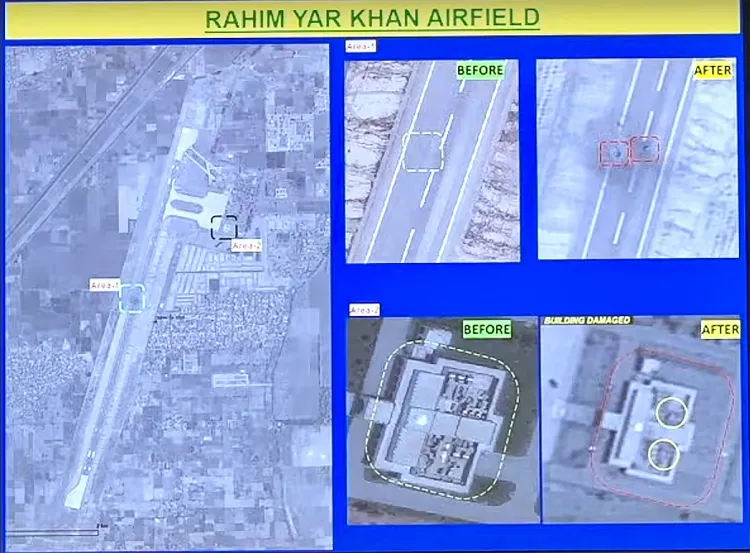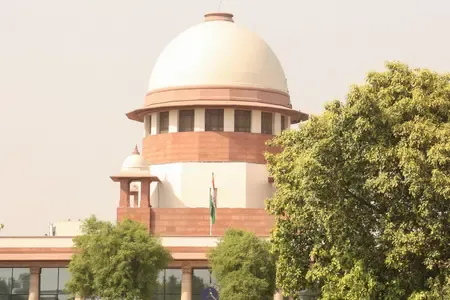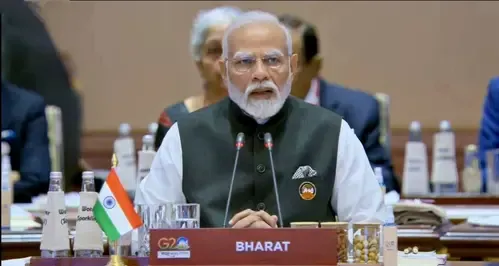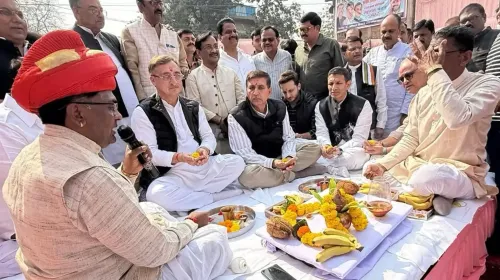Did India Really Destroy 15 Terrorist Camps, Including the LeT Headquarters?

Synopsis
Key Takeaways
- Operation Sindoor targeted 15 terrorist camps.
- Key sites included Jaish-e-Muhammed and Lashkar-e-Taiba headquarters.
- Strikes were in response to a deadly attack in Pahalgam.
- Satellite imagery confirmed extensive damage to Pakistani military infrastructure.
- India emphasized its stance on proportional retaliation against aggression.
New Delhi, May 12 (NationPress) India executed a significant counter-offensive against terrorist installations along the Line of Control in Pakistan, named Operation Sindoor, which resulted in the destruction of fifteen pivotal sites associated with extremist factions. Satellite imagery evaluated by OSINT (Open Source Intelligence) expert Damien Symon offered undeniable proof of the devastation inflicted on crucial Pakistani airbases.
One of the prominent targets was ‘Markaz Subhan Allah’ located in Bahawalpur, the main training ground for Jaish-e-Muhammed (JeM) leaders and militants.
Equally notable was ‘Markaz Taiba’ in Muridke, close to Lahore, which served as the headquarters for Lashkar-e-Taiba (LeT), notorious for planning the 2008 Mumbai attacks.
Another significant strike was on ‘Mehmoona Joya’ in Sialkot, a stronghold of Hizbul Mujahideen (HM), recognized for sending infiltrators into Jammu and Kashmir.
Additional locations targeted included ‘Sawahi Nallah Camp’, ‘Markaz Syedna Bilal’, ‘Markaz Abbas Kotli’, and ‘Markaz Ahle Hadith’.
These strikes were a direct reaction to a series of cross-border drone incursions and targeted assaults.
India’s precise airstrikes caused extensive damage to numerous Pakistani military facilities, escalating tensions along the LoC, where both nations exchanged heavy fire.
During three days of heightened military actions, Indian fighter jets executed precise strikes on nine terror hubs in Pakistan and Pakistan-occupied Kashmir (POK).
This operation was a direct reply to the tragic terrorist attack in Pahalgam on April 22, which resulted in the loss of 26 civilian lives, all tourists.
Recent LANDSAT images from May 10 displayed multiple impact zones at Sargodha Airbase, revealing considerable damage to runway 14/32.
Meanwhile, Rahim Yar Khan Airbase was rendered non-operational, with a NOTAM issued until May 17. Strikes on Nur Khan, Bholari, and Jacobabad Airbases further deteriorated Pakistan’s military capabilities, targeting hangars, operational areas, and radar facilities.
On May 10, following intense Indian strikes and retaliatory Pakistani drone, missile, and artillery attacks, Pakistan’s Director General of Military Operations (DGMO) urgently reached out to his Indian counterpart at 3:30 pm, seeking a ceasefire. India consented but only after delivering a calculated military response.
Twenty hours after the 'understanding' between India and Pakistan, a panel of senior defense officials stated that India had neutralized “100 terrorists across nine locations,” including “three high-profile operatives connected to the Kandahar hijacking and Pulwama attack.”
The panel also clarified that there had been no intrusion or airspace violation by the Pakistan army across international borders.
During a press briefing to discuss military engagements and counter-terrorism efforts, a panel including Lieutenant General Rajiv Ghai, Vice Admiral AN Pramod, and Air Marshal Awadhesh Kumar Bharti provided crucial updates on Operation Sindoor.
Operation Sindoor targeted Pakistan’s essential military assets, including command and airbase structures in Chaklala, Rafiki, and Rahriyar Khan.
Officials emphasized India’s unwavering position that aggression would not go unchallenged, and any escalation would provoke proportional retaliation.
“The response will be fair and punitive,” stated Lieutenant Gen Ghai.
Radar installations at Pasrur and Sialkot were neutralized, and key military targets in Rawalpindi, Rahim Yar Khan, Sukkur, and Sunia were struck using air-launched precision munitions.
Adding to the conflict, Symon unveiled Pakistan’s misinformation campaign, exposing doctored images that falsely portrayed damage to Indian military bases, including an outdated photo of Jammu Airport circulated as recent destruction.









